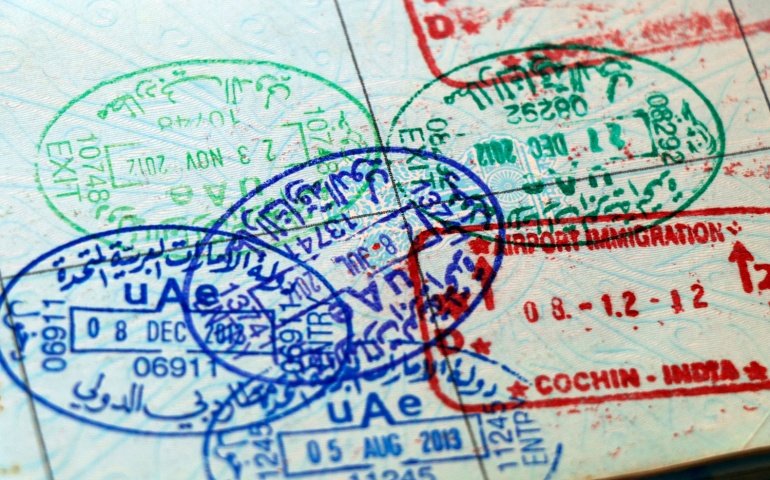For most travelers, an immigration stamp is just a formality—a sign they’ve entered a country. But for 82-year-old Indian educator Mrs. Asha Kumar (name changed), her first-ever Dubai entry stamp, received after 60 years in the UAE, became a symbol of belonging, dignity, and recognition long overdue.
Having lived in the UAE since the early 1960s, Mrs. Kumar has been more than just a resident. She is a community pillar, an education pioneer, and a maternal figure to thousands of students she taught over six decades. And yet, through all those years of selfless service, she never once received a formal immigration stamp in her passport. Until now.
The Emotional Weight of an Ordinary Stamp
On a quiet weekday morning, Mrs. Kumar landed at Dubai International Airport after a short visit to India. She handed over her new passport, updated with recent documentation. For the first time, the immigration officer glanced at her name, smiled gently, and pressed the inked stamp on the page—marking her first official entry into Dubai.

In that moment, decades of dedication, quiet patience, and invisible service crystallized into a simple rectangular mark.
“It was surreal,” said Mrs. Kumar, choking back tears. “I have seen Dubai grow from a desert town into a global city, and all this time, I never had a stamp. I didn’t expect one now. But here it is.”

The occasion was made even more poignant by the warm welcome she received from ex-students and colleagues who had gathered in the arrivals area. Some held placards that read “Welcome Home, Madam” while others clapped and hugged her with reverence.
A Life Woven Into UAE’s Education Landscape
Mrs. Kumar first arrived in Dubai in 1965, at a time when the region was still a British protectorate and had limited infrastructure. She was one of the few Indian women who ventured abroad for work in education—an act of boldness and vision.
She began her teaching journey at The Indian High School, Dubai, which had just opened its doors in 1961. From blackboard chalk to smart boards, Mrs. Kumar witnessed and led transformative changes in teaching methods, curriculum design, and student development.
Over the years, she also helped set up curriculum standards, mentored hundreds of junior teachers, and served as a bridge between parents and administration in a culturally complex expat community. For many, she was more than a teacher—she was a guardian of values, discipline, and identity.

An Overlooked Generation of Builders
Mrs. Kumar’s story is not an isolated one. She represents a generation of Indians who came to the Gulf when documentation systems were rudimentary and immigration rules were loosely enforced—or in some cases, non-existent. Many of them lived for decades without formal residency or exit-entry stamps, relying on sponsor endorsements, school affiliations, or informal approvals.
While they worked, contributed, and raised families, they remained paperless in many respects. This often made them ineligible for modern benefits like long-term visas, retirement residencies, or even official travel records.
That one Dubai entry stamp is, for Mrs. Kumar, the first formal acknowledgment of her physical presence in a city where she’s lived, taught, and grown old.
Policy Shifts: A New Era for Long-Term Residents
What changed now? As part of the UAE’s evolving immigration policy, authorities have taken significant steps toward acknowledging and empowering long-term residents, especially those who contributed to national development in education, healthcare, and infrastructure.
In February 2025, new visa-on-arrival guidelines and residency benefits for Indian nationals came into effect. These changes allow previously undocumented long-term residents to register, update their documentation, and receive full recognition of their status.
Mrs. Kumar, aided by her school’s legal team and a group of passionate ex-students, completed the necessary paperwork under these new policies. It took weeks of coordination, but the outcome was that long-awaited first stamp.
A Teacher’s Legacy Lives On
Today, Mrs. Kumar lives in a modest apartment in Bur Dubai, surrounded by scrapbooks, trophies, and hand-written letters from former students. One wall of her living room is lined with framed photos from annual days, graduation ceremonies, and farewell cards.
Students now working as doctors, engineers, teachers, and business owners often drop by to visit her, sometimes with their children. Many say that what they learned from “Madam” went far beyond the syllabus—it was about discipline, respect, and confidence.
“She taught us to be proud of who we are. That’s not in any textbook,” said Pradeep Menon, now a teacher himself in Sharjah.
Recognition Still Lagging Behind

While Mrs. Kumar’s story has received heartwarming attention, it also raises a broader question: how many other long-serving educators, nurses, and blue-collar workers continue to live without documentation or official acknowledgment?
Education experts and community leaders believe this moment should be a turning point. Schools across the UAE are now considering forming committees to identify elderly staff members or retirees who might benefit from the new legal pathways.
“Let’s not wait until it’s too late. These people deserve more than just stamps—they deserve pensions, benefits, and a proper retirement plan,” said a Dubai-based principal.
A Symbol of Belonging and Hope
When asked how she feels now that she finally has an official entry stamp, Mrs. Kumar smiles humbly.
“This stamp may be small on paper, but to me, it’s a recognition of my life here. Dubai is home. It always has been. But now, it’s home officially.”
Her story resonates deeply at a time when identity and recognition matter more than ever. It shows that it’s never too late to be seen, honored, and validated—especially for those who built their lives in service to others.
Final Thoughts: A Stamp That Speaks Volumes
Mrs. Kumar’s journey reminds us that recognition has no expiration date. In a world moving faster than ever, taking time to acknowledge those who helped build it—quietly, patiently, and selflessly—is a mark of true progress.
Her story is not only touching but also empowering. It paves the way for future reforms and reminds us that every act of service deserves to be remembered—whether it’s written in a report or stamped in a passport.
And so, as the ink of that first Dubai stamp begins to dry, a chapter closes on decades of waiting—and a new one begins, filled with gratitude, belonging, and yes, official recognition.
Do follow UAE Stories on Instagram
Read More: UAE’s Bold Gas Crackdown Sparks Safer Homes & Businesses!












